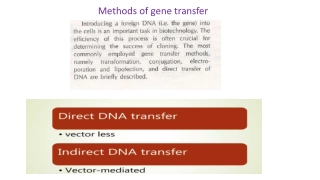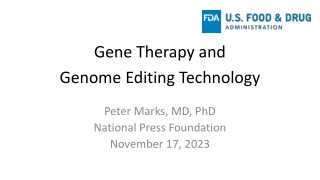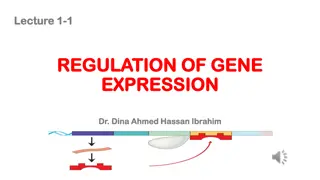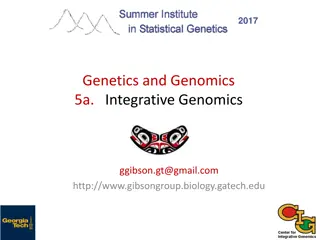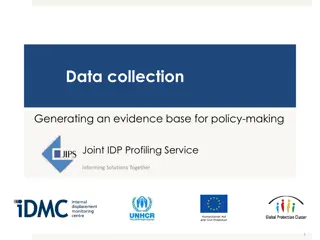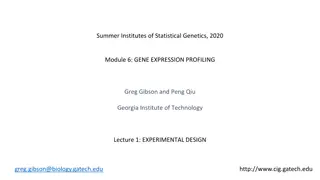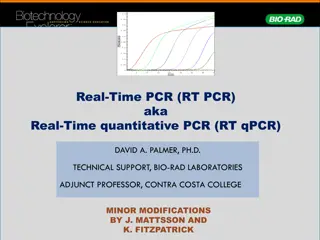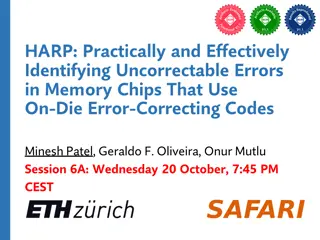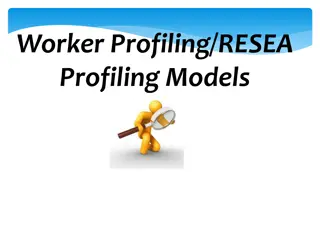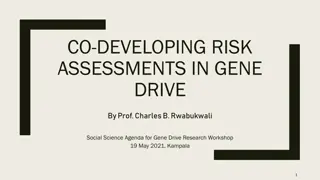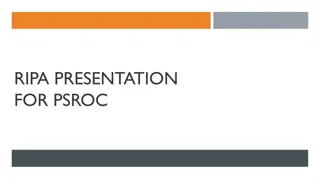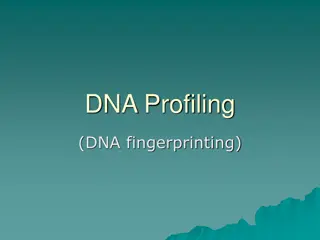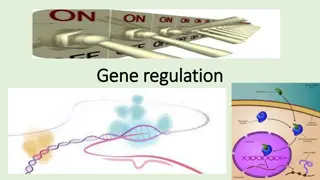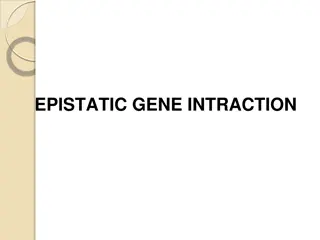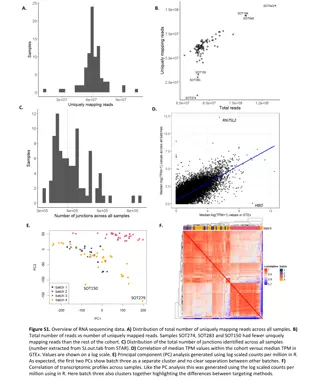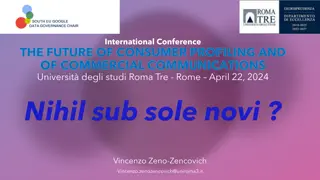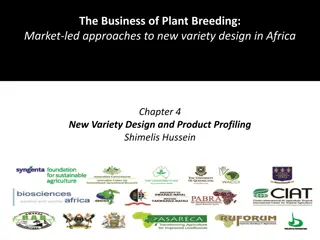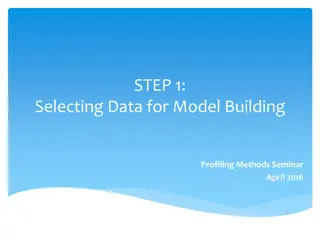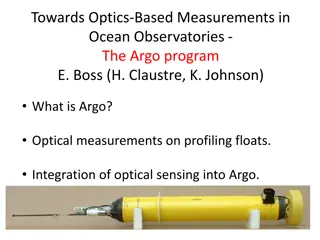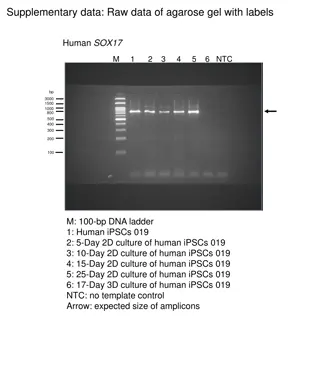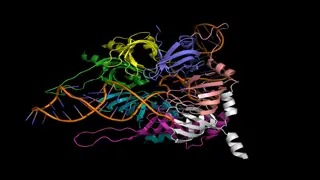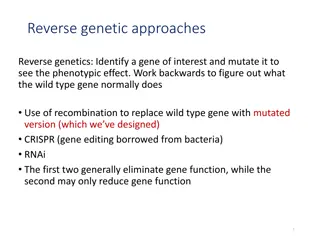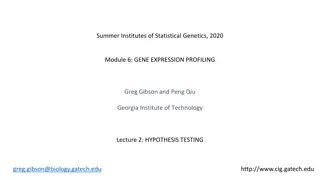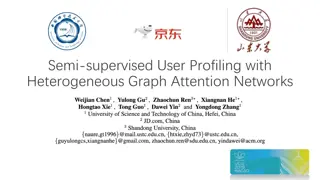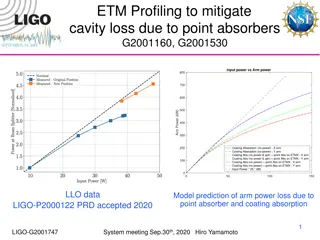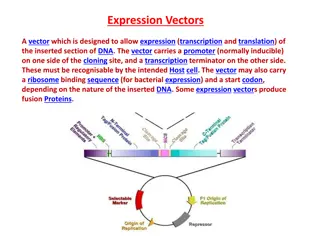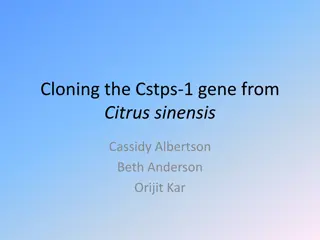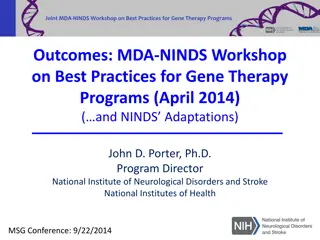Overview of Gene Transfer Methods in Molecular Biology
Explore various physical and chemical methods used for gene transfer, including electroporation, particle bombardment, microinjection, ultrasound, and bacterial transformation. Learn how DNA enters the nucleus and the role of retroviruses in gene transfer efficiency. Understand the process of RNA co
0 views • 17 slides
Gene Therapy and Genome Editing Technology
This article provides insights into the status, regulatory considerations, and delivery methods of gene therapy and genome editing technologies. It discusses approved gene therapies in the US, human genome editing in clinical applications, and the regulatory authority of the FDA over gene therapy. T
3 views • 27 slides
Understanding Vocational Profiling Tools for Career Progression
Vocational profiling tools help assess individual skills, interests, and needs to support career decisions. Components include dreams, skills, learning styles, and support systems. Effective profiles focus on aspirations, talents, challenges, and solutions, guiding individuals towards suitable emplo
4 views • 9 slides
Understanding Gene Expression Regulation in Prokaryotes and Eukaryotes
Gene expression is a crucial process that leads to the production of functional gene products like RNA and proteins. This article explores the regulation of gene expression in both prokaryotes and eukaryotes, covering the importance of regulating gene expression, types of regulation elements, specif
5 views • 22 slides
Understanding Artefacts and Biases in Gene Set Analysis
Gene set enrichment tests help identify functional gene sets enriched in hit lists compared to background sets. Various biases (technical, biological, statistical) can lead to incorrect conclusions in data analysis, emphasizing the importance of recognizing and addressing them. Technical biases like
0 views • 29 slides
Exploring Genetics and Genomics in Integrative Biology
Delve into the world of genetics and genomics through the lens of integrative biology, investigating the differences between cell types, the rationale for gene expression profiling, and the analysis of differential gene expression in various diseases. Uncover the significance of gene ontology, co-ex
0 views • 22 slides
Importance of Data Collection in Policy-Making for IDP Profiling
Understanding the significance of collecting data for policy-making is crucial, especially in the context of Joint IDP Profiling services. Profiling IDPs through collaborative data collection helps identify displaced individuals or groups, leading to targeted advocacy, protection, assistance, and ev
0 views • 15 slides
Gene Expression Profiling in Statistical Genetics Summer Institute 2020
This content provides information on the Summer Institutes of Statistical Genetics module, focusing on gene expression profiling. It includes details on the schedule, experimental design, RNA sequencing workflow, modes of bulk RNA sequencing, and RNASeq software. The content discusses crucial steps
0 views • 11 slides
Understanding Real-Time PCR and its Applications
Real-Time PCR, also known as quantitative PCR, is a specialized technique used in molecular biology for gene expression analysis, medical research, disease diagnosis, viral quantification, and more. It enables the real-time visualization and measurement of DNA sequences in a sample, playing a crucia
4 views • 8 slides
Efficient Identification of Memory Chip Errors with On-Die ECC
State-of-the-art memory error mitigations face challenges when dealing with on-die Error-Correcting Codes (ECC). "HARP" introduces a Hybrid Active-Reactive Profiling method to address these challenges by analytically studying the effects of on-die ECC and identifying key issues. Through hybrid profi
1 views • 4 slides
Understanding RESEA Program in Worker Profiling and Reemployment Services
The RESEA program aids in assessing unemployment insurance eligibility and providing reemployment services to claimants. Profiling helps target those at risk of long-term unemployment. Coordination between UI and employment service providers is essential for effective state operations. New initial c
0 views • 24 slides
Understanding Gene Mutations in Molecular Biology
Gene mutations play a significant role in molecular biology, leading to alterations in DNA sequences that can impact offspring. These mutations can arise spontaneously or be induced by various factors, such as mutagens. Understanding gene mutations is crucial for comprehending the genetic basis of c
2 views • 27 slides
Co-Developing Risk Assessments in Gene Drive
Gene drive technology is a cutting-edge approach aimed at combating malaria by spreading genetically modified genes in mosquito populations. This technology has the potential to protect endangered species and conserve nature. However, successful implementation requires complex collaborations, risk a
2 views • 16 slides
Understanding Gene Therapy: Types, Techniques, and Applications
Gene therapy involves introducing DNA into a patient to treat genetic diseases by correcting disease-causing mutations. There are two types of gene therapy: somatic gene therapy and germline gene therapy, each with different implications. Techniques such as gene augmentation therapy and gene inhibit
1 views • 15 slides
LLVM Line Coverage Profiling Implementation Overview
Line coverage profiling in LLVM is implemented using built-in instrumentation facilities. This approach involves inserting PGO probes, interpreting them as coverage measurements, and generating coverage reports to assess the coverage of a test suite. The process allows for generating profile informa
2 views • 19 slides
Understanding Racial and Identity Profiling Act (RIPA) in California
The Racial and Identity Profiling Act (RIPA) in California requires law enforcement agencies to collect demographic data and other identifying characteristics based on officers' perceptions during pedestrian and traffic stops. The purpose of RIPA is to eliminate racial and identity profiling, improv
3 views • 18 slides
Understanding Profiling in Forensic Psychology
Explore the concept of profiling in forensic psychology, including its techniques, history, and applications in criminal investigations. Learn about the various categories of profiling and the role psychologists play in identifying unknown individuals based on behavioral patterns and characteristics
1 views • 69 slides
Understanding DNA Profiling: Techniques and Applications
DNA profiling, invented by Alec Jeffreys in 1985, is a technique used to distinguish between individuals of the same species based on their DNA. The process involves breaking down cells to release DNA, cutting the DNA into fragments using restriction enzymes, separating and analyzing fragments based
12 views • 23 slides
Understanding Gene Regulation and Control of Gene Expression
This comprehensive content delves into the intricate mechanisms of gene regulation and control of gene expression. It covers topics such as transcriptional regulation, bacterial genes classification, and the role of regulatory proteins. Explore how genes are regulated at transcription, translation,
0 views • 17 slides
Understanding Gene Expression in Biological Sciences Course
Explore the dynamic world of gene expression with the Chunky and Chips Gene Expression Group at the University of Notre Dame. Dive into topics like transcription, translation, and cellular events influencing gene expression. Delve into real-world scenarios and gain insights into the cellular level b
0 views • 20 slides
Understanding Epistasis: Genetic Interactions and Their Implications
Epistasis is a phenomenon where the phenotypic expression of one gene is influenced by interactions with another gene. This concept, first introduced in 1909, plays a crucial role in genetics, affecting various traits and evolutionary processes. The difference between dominance and epistasis lies in
0 views • 41 slides
Overview of RNA Sequencing Data: Insights from Transcriptomic Profiling
This data set presents key findings from RNA sequencing analysis, including distribution of mapped reads, junction identification, TPM correlation, principal component analysis, and gene expression effects. Visual representations illustrate differences in gene expression profiles across samples, emp
0 views • 6 slides
The Future of Consumer Profiling and Commercial Communications: Insights from an International Conference
Explore the impact of platform economies, neuromarketing, and AI on commercial communications in the digital age. Learn how VLOPs use data to create user profiles and drive targeted advertising. Delve into the challenges of regulating VLOPs in the evolving landscape of consumer profiling.
0 views • 6 slides
Market-Led Approaches to New Variety Design in Africa
Explore Chapter 4 of "The Business of Plant Breeding" focusing on new variety design and product profiling in Africa. Understand core methods of product profiling, trait prioritization, and setting breeding objectives to meet client needs. Learn how to create new designs, set benchmarks, and make tr
0 views • 45 slides
Effective Data Selection Strategies for Model Building in Profiling Methods Seminar
Learn about the essential steps involved in selecting the right data for building effective models in the field of profiling methods. Understand the key considerations for data collection, formats, sample set determination, and targeting the right population to derive meaningful insights and outcome
0 views • 40 slides
Gene Wiki Jamboree FaceBase Spring Meeting Summary
The Gene Wiki Jamboree FaceBase Spring Meeting in 2010 aimed to create collaboratively-written and community-reviewed review articles for every gene in the human genome and every concept relevant to FaceBase. It highlighted the value of such articles, providing quick summaries and compilations of re
0 views • 13 slides
Advancements in Optical Measurements for Ocean Observatories: The Argo Program
The Argo program integrates optical sensing into ocean observatories using profiling floats to gather data from the deep sea. With nearly 1,000,000 profiles to date, the Argo Observing System offers a global, real-time monitoring solution. Utilizing optics on profiling floats has enabled observation
0 views • 12 slides
Raw Data of Agarose Gel for Human Gene Expression Analysis
This supplementary data includes raw data from agarose gel electrophoresis showing gene expression levels for human SOX17, FOXA2, AFP, ALB, and ACTB in various cellular samples. The gel images depict the expected sizes of amplicons for each gene in different conditions and time points of cell cultur
0 views • 5 slides
Understanding Splice Sites and Splicing Elements in the Inhibitory Dopamine Receptor Gene (D2)
In this project, the focus is on identifying splice sites relevant to the inhibitory dopamine receptor gene (D2). The problem involves finding splicing elements within a specific range of known splice sites in the gene. The data provided includes the D2 gene entry in FASTA format, a database of spli
0 views • 13 slides
Profiling, Travel Bans, and Legal Rights Overview
Profiling individuals based on their characteristics for making decisions raises legal and ethical concerns, particularly when involving race, ethnicity, or religion. This excerpt highlights a case involving profiling during air travel, leading to wrongful detainment and questioning of individuals w
0 views • 49 slides
Understanding Reverse Genetic Approaches in Gene Manipulation
Reverse genetic approaches involve mutating a target gene to observe its phenotypic effects, providing insights into the gene's normal function. Techniques like gene knockout, knockdown, and homologous recombination are used to manipulate genes and study genetic pathways, leading to discoveries in v
0 views • 6 slides
Continuous Asphalt Mixture Compaction Assessment Using Density Profiling System
Development of a comprehensive work plan for the assessment of asphalt mixture compaction using the Density Profiling System (DPS). The project aims to create a master database of field and lab measurements, refine protocols for dielectric value-density relationships, propose changes for sensor bias
0 views • 11 slides
Basics of Hypothesis Testing in Gene Expression Profiling
The lecture covers the essential aspects of hypothesis testing in gene expression profiling, emphasizing experimental design, confounding factors, normalization of samples, linear modeling, gene-level contrasts, t-tests, ANOVA, and significance assessment techniques. Practical insights are shared on
0 views • 9 slides
Semi-Supervised User Profiling with Heterogeneous Graph Attention Networks
Utilizing heterogeneous graph attention networks, this study addresses the limitations of existing user profiling methods by integrating multiple data types and capturing rich interactions in user data. The approach tackles critical problems in representation learning, information propagation, and m
0 views • 15 slides
ETM Profiling for Cavity Loss Mitigation Due to Absorbers
The ETM profiling aims to mitigate cavity loss caused by point absorbers through input power analysis versus arm power. The study includes data on coating absorption, arm power loss predictions, and optimization strategies such as polishing and mirror surface design. The effect of new coatings is co
0 views • 48 slides
Basics of Genetics Engineering: Introduction to DNA and Gene Expression
Exploring the fundamentals of genetics engineering, this lecture covers topics such as DNA structure, gene expression, gene function, genome, mutation, recombination, and genetic modification. Understand the significance of DNA, genes, and the processes involved in gene expression. Dive into the wor
0 views • 20 slides
Understanding Expression Vectors for Efficient Gene Expression
Expression vectors are designed to facilitate gene expression by carrying essential elements such as promoters, terminators, and fusion tags. They allow precise control over gene regulation for transcription and translation in host cells, enabling efficient protein production. Different promoters li
0 views • 15 slides
Cloning the Cstps-1 Gene from Citrus sinensis for Valencene Production
In this project, the Cstps-1 gene from Citrus sinensis is being cloned to produce the enzyme Citrus Valencene Synthase (CVS) responsible for generating the fragrant valencene compound. The process involves DNA isolation from a Valencia orange, gene amplification, vector transformation, and testing f
0 views • 8 slides
Understanding the Role of Multiple Enhancers in Gene Regulation
Multiple enhancers play a crucial role in regulating gene expression in a cell, with approximately 3-5 enhancers associated per human gene. These enhancers are essential for tissue-specific expressions and are active within the same cell line. The use of multiple enhancers can impact gene expression
0 views • 30 slides
Advances in Gene Therapy Programs and Best Practices Workshop Insights
Workshop outcomes and discussions from the MDA-NINDS Workshop on Best Practices for Gene Therapy Programs, highlighting key challenges, possible solutions, and the impact on translational funding programs. The workshop format included orienting talks and panels focusing on scientific premise, regula
0 views • 17 slides
